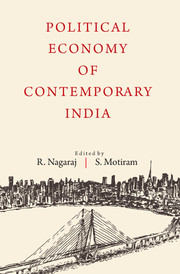Book contents
- Frontmatter
- Contents
- List of Tables and Maps
- List of Figures and Pictures
- Preface
- 1 Introduction: From ‘Intermediate Regime’ to Crony Capitalism
- Economy-wide Considerations
- Political Economy by Regions of India
- Urban Labour Markets
- Land and Rural Labour
- 9 Peripheral Agriculture? Macro and Micro Dynamics of Land Sales and Land Use Changes in the ‘Rural’ Economy of Kancheepuram
- 10 Infrastructures of Growth, Corridors of Power: The Making of the SEZ Act 2005
- 11 Land-based Financing for Infrastructure: What is New about India's Land Conflicts?
- 12 Political Economy of Land Acquisition and Resource Development in India
- 13 Advice and Dissent: The Federal Politics of Reforming India's Land Acquisition Legislation
- 14 ‘Workers’ or ‘Beneficiaries’: The Varied Politics of NREGA Implementation in South-West Madhya Pradesh
- About the Contributors
- Index
13 - Advice and Dissent: The Federal Politics of Reforming India's Land Acquisition Legislation
from Land and Rural Labour
Published online by Cambridge University Press: 08 February 2018
- Frontmatter
- Contents
- List of Tables and Maps
- List of Figures and Pictures
- Preface
- 1 Introduction: From ‘Intermediate Regime’ to Crony Capitalism
- Economy-wide Considerations
- Political Economy by Regions of India
- Urban Labour Markets
- Land and Rural Labour
- 9 Peripheral Agriculture? Macro and Micro Dynamics of Land Sales and Land Use Changes in the ‘Rural’ Economy of Kancheepuram
- 10 Infrastructures of Growth, Corridors of Power: The Making of the SEZ Act 2005
- 11 Land-based Financing for Infrastructure: What is New about India's Land Conflicts?
- 12 Political Economy of Land Acquisition and Resource Development in India
- 13 Advice and Dissent: The Federal Politics of Reforming India's Land Acquisition Legislation
- 14 ‘Workers’ or ‘Beneficiaries’: The Varied Politics of NREGA Implementation in South-West Madhya Pradesh
- About the Contributors
- Index
Summary
Introduction
The Right to Fair Compensation and Transparency in Land Acquisition, Rehabilitation and Resettlement Act 2013 (LARRA) was among the last major laws passed by the Congress-led United Progressive Alliance (UPA) government of Prime Minister Manmohan Singh, which governed India from 2004 to 2014. LARRA was passed just eight months prior to India's 2014 general election, in which the Bharatiya Janata Party (BJP) won enough seats to form a parliamentary majority under Prime Minister Narendra Modi, but also remained at the head of a coalition known as the National Democratic Alliance (NDA). Along with the National Food Security Act 2013 (NFSA), also passed during the UPA's final year in office, LARRA was one of the rights-based laws – including the Right to Information Act 2005 and the Right to Education Act 2010 – passed during Manmohan Singh's decade in power (Jenkins, 2013).
LARRA defines a set of rules, procedures, and oversight structures to govern the state's use of its power of ‘eminent domain’, as well as the responsibilities of state and private entities to individuals and groups adversely affected by the exercise of this power. This encompasses such issues as justifying the public purpose served by the acquisition (LARRA imposed higher standards), protecting certain categories of land (such as irrigated farmland), and assessing the likely social and economic impacts that would arise were land to be forcibly acquired. The politics surrounding LARRA's passage in late 2013 were complex and revealing about the character of the Indian state and the dynamics of India's policymaking processes (Jenkins, 2014), and are discussed briefly in the next section of this chapter. The strong cross-party support for LARRA also reflected the widespread feeling that the Land Acquisition Act 1894 (LAA), introduced by the British colonial government (though amended periodically after independence in 1947), was unable to afford the protections that a more aware and assertive public, operating in a modern democracy, increasingly demanded. Moreover, the protests were causing political instability and prompting potential investors to reassess the worth of the property rights they had negotiated with the state. A 2013–2014 study, which uncovered a total of 252 land-related conflicts, found that a quarter of India's districts experienced a significant level of land-related conflict, and that a majority of the most contentious cases involved the compulsory acquisition of land by state agencies (Society for Promotion of Wastelands Development and Rights and Resources Initiative, 2014).
- Type
- Chapter
- Information
- Political Economy of Contemporary India , pp. 307 - 330Publisher: Cambridge University PressPrint publication year: 2016



